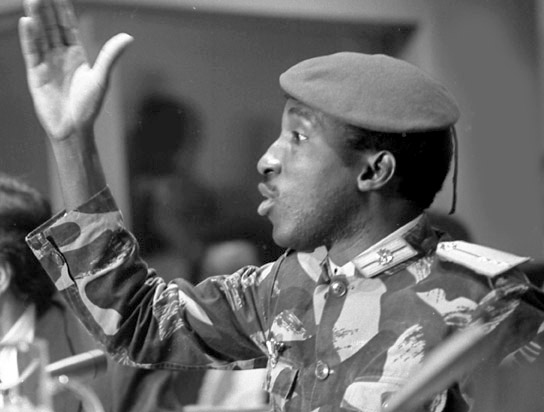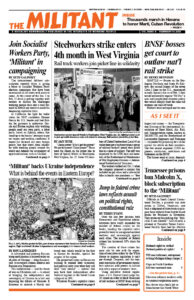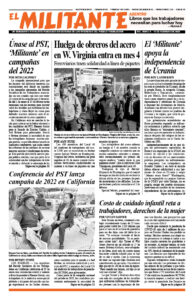
We Are Heirs of the World’s Revolutions: Speeches from the Burkina Faso revolution 1983-87 by Thomas Sankara is one of Pathfinder’s Books of the Month for February. In August 1983 Sankara led a revolution in the former French colony of Upper Volta, establishing a popular revolutionary government that organized workers, peasants, women and youth to take their destiny into their own hands. Sankara was assassinated in a counterrevolutionary coup in October 1987. The excerpt is from the book’s preface, remarks made by Pathfinder Press President Mary-Alice Waters to a 2005 meeting in Havana presenting the Spanish-language edition. Copyright © 2007 by Pathfinder Press. Reprinted by permission.
From the very beginning, one of the hallmarks of the revolutionary course Sankara fought for was the mobilization of women to fight for their emancipation. As he says in one of the speeches published here, an October 1983 talk that presents the program of the government he headed, “The revolution and women’s liberation go together. We do not talk of women’s emancipation as an act of charity or out of a surge of human compassion. It is a basic necessity for the revolution to triumph. Women hold up the other half of the sky.”
Sankara’s powerful speech to a gathering of several thousand women on International Women’s Day, March 8, 1987 — also contained in Thomas Sankara Speaks — has been published by Pathfinder as a pamphlet, Women’s Liberation and the African Freedom Struggle. …
We are proud that with the publication of this selection of some of the most representative of Sankara’s other speeches, his voice will now be heard more broadly in Spanish. Somos herederos de las revoluciones del mundo includes, for example, his powerful speech on imperialism’s destruction of the trees and forests of Africa, given to an international conference in Paris in 1986.
Before top dignitaries of the French imperialist government, Sankara affirmed:
The battle against the encroachment of the desert is a battle to establish a balance between man, nature, and society. …
As Karl Marx said, those who live in a palace do not think about the same things, nor in the same way, as those who live in a hut. This struggle to defend the trees and forests is above all a struggle against imperialism. Imperialism is the arsonist setting fire to our forests and our savannahs.
That speech by Sankara is cited extensively in the recently produced issue number 13 of New International magazine, which is also being presented here today. From its lead article, entitled “Our Politics Start with the World,” by Jack Barnes, to the photo of Earth at Night on its back cover — a photo that captures the economic and cultural inequalities, the veritable abyss, that exists between the imperialist and semicolonial countries, and among classes within almost every country — this issue of the magazine of Marxist politics and theory distributed by Pathfinder deals in depth with many of the same political issues and the course of action Sankara fought to advance.
To end, I want to point to the depth of Sankara’s internationalism so evident in these pages. For him, the popular, democratic, revolutionary struggle of the people of Burkina Faso was one with the struggles to bring down the apartheid regime of South Africa; it was one with the anti-imperialist struggles of the people of Angola, Namibia, Palestine, Western Sahara, and Nicaragua; it was one with the people of Harlem who so warmly welcomed him there in 1984; it was one with the working people of France, the United States, and across the imperialist world.
It was in Managua in 1986 that I had the pleasure of meeting and coming to know Sankara as a leader. We were both delegates to an international conference marking the twenty-fifth anniversary of the founding of the Sandinista National Liberation Front (FSLN) and the tenth anniversary of the fall in combat of founding FSLN leader Carlos Fonseca. Sankara was chosen to speak at the rally on behalf of the 180 international delegations present there.
When he learned that a delegation from the Socialist Workers Party in the United States was present, he made a point of heading straight to our table to greet us. It was not just as an act of diplomacy; he came to talk politics with fellow revolutionists. He knew that the Militant newsweekly was one of the few papers outside Africa that regularly wrote about the revolutionary course unfolding in Burkina Faso, carrying interviews and speeches by Sankara whenever we could get them.
[The book also] contains Sankara’s tribute to Che on October 8, 1987. That twentieth anniversary of Che’s fall in combat was barely a week before the counterrevolutionary coup d’etat that ended Sankara’s own life.
It is only because of a fortunate combination of circumstances that Sankara’s words at that memorable event are available to us today. The exhibition focusing on Che’s revolutionary course and example, inaugurated that day by Sankara, coincided with the opening of an international antiapartheid conference in Ouagadougou attended by delegations from some twenty-nine countries. Among them were compañeros from the United States and Canada, supporters of the Militant newspaper, and of Pathfinder Press.
They were looking at the displays when Sankara arrived together with Che’s son Camilo and a number of other Cuban compañeros. When Sankara began his impromptu remarks, one of the Canadian compañeras pulled out a tape recorder she had in her backpack and recorded them. The Militant transcribed and published them shortly afterward, and they are included here in their totality.
Che taught us “we could dare to have confidence in ourselves and our abilities,” Sankara pointed out on that occasion. Che instilled in us the conviction that “struggle is our only recourse.”
Che, Sankara insisted, was “a citizen of the free world — the free world that we’re building together. That’s why we say that Che Guevara is also African and Burkinabè.”

